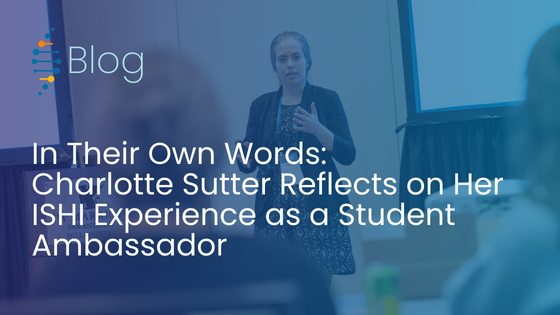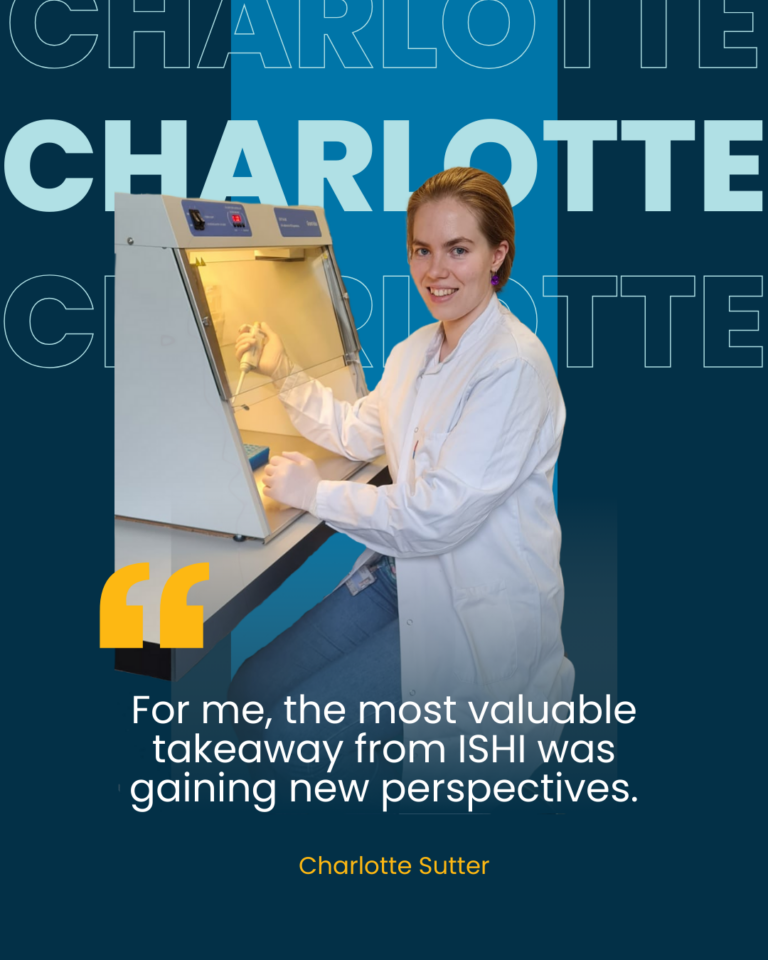Are you a passionate student pursuing a degree in forensic science, eager to dive into the world of cutting-edge research and groundbreaking advancements? Look no further! The ISHI Student Ambassador Program is your exclusive gateway to unparalleled opportunities at the International Symposium on Human Identification (ISHI) conference. The application window opens on February 3, 2025.
Every year, the International Symposium on Human Identification (ISHI) brings together forensic professionals from around the world to share their latest research and connect with peers. But some of the most inspiring moments come from the students—those just starting their journey into the world of forensic science. As part of the ISHI Student Ambassador Program, young scientists are given the opportunity to present their work, engage with leaders in the field, and gain invaluable insights into the profession. In this blog, we sit down with Charlotte Sutter, a PhD student at the Zurich Institute of Forensic Medicine and one of this year’s ambassadors to hear about her experiences at ISHI. From connecting with peers to exploring new research methodologies, these reflections offer a unique glimpse into the future of forensic science.

In your application essay, you mentioned you were excited to meet fellow student ambassadors and young scientists from around the world. Were you able to make some connections during your time at the conference and, if so, how did these connections and conversations influence your outlook on your own research and career?
My initial expectations for ISHI weren’t particularly high. I thought it would be a good opportunity to connect with a few people, listen to some interesting talks, gain different perspectives on certain topics, and maybe even gather a bit of input for my own research projects. Little did I expect to actually make friends there! I feel incredibly lucky to have met this year’s student ambassadors – we all got along so well, both during and already before ISHI. We were in contact well ahead of ISHI, and even managed to hang out a bit during the conference week, despite the packed schedule. So beyond the inspiring people I met, the fresh perspectives I gained, and the valuable input for my research, meeting the other student ambassadors alone made this trip worthwhile!
What advancements or methodologies shared at ISHI are you most eager to bring back to your own work in Switzerland?
For me, the most valuable takeaway from ISHI was gaining new perspectives, rather than any specific advancements or methodologies. Much of the research presented during the poster sessions was at least somewhat familiar to me, although I still really enjoyed reading about topics outside of my direct expertise in more details. The manageable number of posters also allowed me to actually look at most of them, which I found to be an advantage compared to previous conferences I’ve attended.
So, the most important thing I brought back from ISHI really was a renewed appreciation for the relevance and significance of the research being conducted in forensic genetics labs. This really gave me fresh motivation and joy for my own projects, seeing how the work we do each day can ultimately help solve important cases.

How did attending a U.S.-based conference differ from any forensic science events you’ve attended in Europe? Were there any moments where being an international student provided you with a unique perspective or opened up unexpected opportunities?
The most noticeable difference between ISHI and the Europe-based conferences I’ve attended so far was the conference program itself. While vendor showcases and interactions with other scientists were similar to other events I have been to, the content focus at ISHI was quite different. Whereas Europe-based conferences tend to focus on new research developments, techniques, and cutting-edge projects, ISHI was more about presenting the application of existing tools to real cases and resolving them through advanced DNA techniques. Although I enjoy discussing research with colleagues from other labs at conferences, ISHI offered different insights I don’t usually get as a student, which I found incredibly intriguing. From testimonies of relatives of victims of crime to perspectives from members of different branches of law enforcement, each keynote and talk was unique, exciting, or emotional.
On a lighter note, one of the most fun aspects of being an international student at ISHI was the excitement people showed when they found out where I study: ‘Oh, you’re from Switzerland!? How cool!’
You presented your research on methylation-based age estimation in bones at ISHI. How did the feedback from this global audience shape your future work, and what insights did you gain from discussing your research with experts from various countries?
I think the most important insight I gained while presenting my research at ISHI was how different audiences have varying expectations based solely on a presentation’s title or abstract. At conferences in Europe, for example, people typically understand right away that methylation-based age estimation most often refers to determining the age of a stain donor, rather than the time elapsed since the stain was deposited. However, at ISHI, I found that I first had to clarify this distinction before being able to talk about the actual project. This experience gave me a new perspective on how a presentation I thought was clear might not be, depending on the audience’s research background. I am very grateful for this insight, as it will help me better understand what needs clarification in my future presentations.
How do you think future international students can benefit from attending ISHI and being part of this global community? What advice would you give to other international students who might feel unsure about applying?
If not for the conference talks, workshops, or vendors, go for the other students you will meet as a student ambassador! Every conference you attend as a young scientist provides valuable insights and opportunities to connect with colleagues in the field, and in that sense, ISHI is just another major event you shouldn’t miss. However, the student ambassador program really allows you to build close connections with your fellow ambassadors beyond a “Nice to meet you. That is an interesting topic you are talking about”. Meeting students from different labs, countries, and research backgrounds not only offers new perspectives and ideas but also allows for eye-level conversations about common challenges and struggles. I was incredibly fortunate to meet the other ISHI 2024 student ambassadors and form some amazing friendships during the ISHI35 week.
So, if you are unsure about applying, consider this: it is completely normal to wonder whether it is worth the effort or if you will even be considered – I certainly felt that way! But if even remotely you feel like you might enjoy this experience, I highly recommend going for it. For me, it was absolutely worth it!

